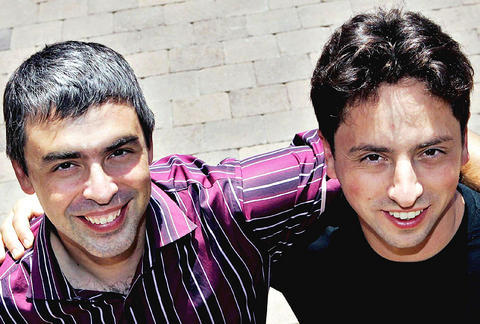A billion dollars just doesn't go as far as it used to.
For the first time, it takes more than US$1 billion to earn a spot on Forbes magazine's list of the 400 richest Americans. The minimum net worth for inclusion in this year's rankings released on Thursday was US$1.3 billion, up US$300 million from last year.
The new threshold meant 82 billionaires didn't make the cut.

PHOTO: EPA
Collectively, the people who made the rankings released on Thursday are worth US$1.54 trillion, compared with US$1.25 trillion last year.
The very top of the list was unchanged: Microsoft Corp founder Bill Gates led the list for the 14th straight year, this time with a net worth estimated at US$59 billion.
He was followed by Warren Buffett of Berkshire Hathaway Inc in second place with an estimated US$52 billion and casino mogul Sheldon Adelson, No. 3 with an estimated worth of US$28 billion.
Larry Ellison of Oracle Corp maintained his ranking at No. 4, with an estimated net worth of US$26 billion.
But the list showed some notable changes.
Joining the top 10 of the country's richest for the first time were Google Inc founders Sergey Brin and Larry Page, who tied for fifth place.
The 34-year-old moguls' wealth has quadrupled since 2004 to an estimated US$18.5 billion this year, while their company's stock value has surged 500 percent.
And, lower down, almost half of the 45 newcomers made their millions in hedge funds and private equity investments. The youngest member of this year's list was 33-year-old hedge fund manager John Arnold, who joined the ranks at No. 317 and a net worth of US$1.5 billion.
"Wall Street really led the charge this year," said Matthew Miller, editor of the Forbes list.
Surging oil prices also helped some members of the list. Oil baron brothers Charles and David Koch shared the No. 9 spot with estimated wealth of US$17 billion.
Their ascension bumped the Walton family, heirs to the Wal-Mart Stores Inc fortune, from the top 10 for the first time since 1989.
Also in the top 10 was Michael Dell of computer maker Dell Inc at No. 8.

MORE VISITORS: The Tourism Administration said that it is seeing positive prospects in its efforts to expand the tourism market in North America and Europe Taiwan has been ranked as the cheapest place in the world to travel to this year, based on a list recommended by NerdWallet. The San Francisco-based personal finance company said that Taiwan topped the list of 16 nations it chose for budget travelers because US tourists do not need visas and travelers can easily have a good meal for less than US$10. A bus ride in Taipei costs just under US$0.50, while subway rides start at US$0.60, the firm said, adding that public transportation in Taiwan is easy to navigate. The firm also called Taiwan a “food lover’s paradise,” citing inexpensive breakfast stalls

TRADE: A mandatory declaration of origin for manufactured goods bound for the US is to take effect on May 7 to block China from exploiting Taiwan’s trade channels All products manufactured in Taiwan and exported to the US must include a signed declaration of origin starting on May 7, the Bureau of Foreign Trade announced yesterday. US President Donald Trump on April 2 imposed a 32 percent tariff on imports from Taiwan, but one week later announced a 90-day pause on its implementation. However, a universal 10 percent tariff was immediately applied to most imports from around the world. On April 12, the Trump administration further exempted computers, smartphones and semiconductors from the new tariffs. In response, President William Lai’s (賴清德) administration has introduced a series of countermeasures to support affected

CROSS-STRAIT: The vast majority of Taiwanese support maintaining the ‘status quo,’ while concern is rising about Beijing’s influence operations More than eight out of 10 Taiwanese reject Beijing’s “one country, two systems” framework for cross-strait relations, according to a survey released by the Mainland Affairs Council (MAC) on Thursday. The MAC’s latest quarterly survey found that 84.4 percent of respondents opposed Beijing’s “one country, two systems” formula for handling cross-strait relations — a figure consistent with past polling. Over the past three years, opposition to the framework has remained high, ranging from a low of 83.6 percent in April 2023 to a peak of 89.6 percent in April last year. In the most recent poll, 82.5 percent also rejected China’s

PLUGGING HOLES: The amendments would bring the legislation in line with systems found in other countries such as Japan and the US, Legislator Chen Kuan-ting said Democratic Progressive Party (DPP) Legislator Chen Kuan-ting (陳冠廷) has proposed amending national security legislation amid a spate of espionage cases. Potential gaps in security vetting procedures for personnel with access to sensitive information prompted him to propose the amendments, which would introduce changes to Article 14 of the Classified National Security Information Protection Act (國家機密保護法), Chen said yesterday. The proposal, which aims to enhance interagency vetting procedures and reduce the risk of classified information leaks, would establish a comprehensive security clearance system in Taiwan, he said. The amendment would require character and loyalty checks for civil servants and intelligence personnel prior to